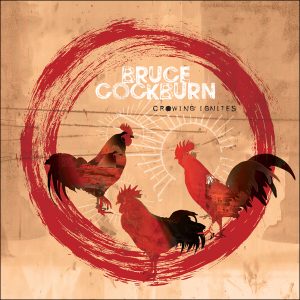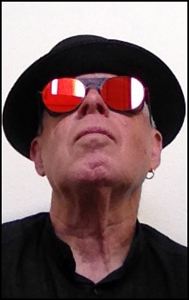by Dean Budnick
November 6, 2019
“The original was to do Speechless Two,” Bruce Cockburn explains, while describing the origins of his new record, Crowing Ignites. On 2005’s Speechless, he recorded some of his prior instrumental compositions, placing a particular focus on his stellar acoustic-guitar work. (Speechless earned him a Canadian Folk Music Award for Best Instrumentalist.) But, while Crowing Ignites once again finds Cockburn on an acoustic, this time the 11 compositions are all new. He explains, “We had a lot of unreleased material, including recordings that didn’t make it on Speechless. But, once I started coming up with a few new pieces, they just didn’t stop coming.”
I wasn’t there but, apparently, when you performed in the Relix office, some of our younger staffers were unaware that your song “Waiting for a Miracle” was not a Jerry Garcia original.
Yes, the kids recognized the song because they are paying attention to the Dead and Jerry’s music. That association is entirely complimentary—it’d be nicer if everyone went, “Oh, yeah, great song,” but that’s the way it goes. I was at the home of someone I know in Oakland, playing some songs to help cheer up his son, and this woman from next door sat down for a while. She was a big Dead fan and, when I played that song, she had no idea it wasn’t a Jerry Garcia song. She was quite skeptical of me claiming that I wrote it. I said, “Yeah, it’s my song,” and she looked at me like, “He’s bullshitting me.” [Laughs.]
These things happen. They don’t happen to me very often because, compared to other songwriters, not a huge number of famous people have recorded my songs. Some have tried, but I don’t know if I’ve ever met a Jimmy Buffett fan, for instance, who has made the connection that he’s recorded some of my songs.
As a young person, it didn’t really matter to me who wrote the song. “Ivory Joe Hunter, who the hell was that?” Now, it’s a bit more fashionable to pay attention to those things, but it’s not that big a deal.
I imagine that some people have been surprised that you released an all-instrumental record during this politically charged era?
Yes, apparently everybody’s expecting me to say something bad about Donald Trump. But everybody else is doing that already; I don’t need to do that, too. He gets enough attention.
Plus, when I look around, everyone’s nattering away: Liberals are bad. Liberals are weird. Liberals are gonna do something bad to my kid. And then, on the liberal side of it, all the conservatives are gonna do these bad things. It’s ridiculous. But who’s listening? We’re all only listening inside our little echo chamber.
What we need is something that promotes unity, something to pull us together and to allow to look at each other and go, “Hey, we all appreciate the same thing here.” That happened in a different kind of way in the 1980s, with Stealing Fire. In the Reagan era, I’d play these shows, and I’d look out at the audience. In response to songs like “Nicaragua” or “If I Had a Rocket Launcher,” people were looking at each other going, “I’m not alone here” because there was no media coverage at that time with a dissenting view. But when all these people were in a concert hall and listening to this music, they were looking at each other and going, “Oh, yeah, all these people feel the way I do about it.” It’s empowering, and a great feeling for me, to witness something like that.
What we need now is something that will come out and do the same thing in a much more difficult context, where you’re dealing with people that just don’t agree with each other. Many of us are coming to recognize that it’s not sustainable to continue like this. There are people interested in exploiting this intentional fragmentation. We’ve got to fix it. I don’t think a song can fix it, but I think a body of popular sentiments expressed in song might.
The song “Bells of Gethsemane,” on Crowing Ignites , features a number of singing bowls. How did that came about?
I went into the studio with all the pieces composed, except for that one and “Seven Daggers.” Over the years, I’ve accumulated a number of singing bowls. They sound so beautiful, and I’ve just always wanted to use them for something. But, the application of them to my normal music is kind of limited because I can’t play the guitar and play those bowls at the same time. Also, they’re not tuned to A440; they’re tuned to whatever they’re tuned to and they’re suggestive of notes, but they are not very clear that way. You have to establish a context. I just thought, “I want to make a piece out of singing bowls. I want to build something using those.” I have all these other things—orchestral chimes, and various other ring-y things that I’ve accumulated. The intention was to build a piece out of all that stuff. So, I put down a couple layers of singing bowls, chimes and various other things, and added the baritone guitar over the top. I was very pleased with how it came out. It’s exciting for me to get that rich sound into a recording.
Your songs often have overt political messages. How do you respond when people receive them in a way that doesn’t entirely align with your intent?
I have to let go of my intentions for a song once it’s out there. I’d go crazy trying to understand where everybody could possibly take my ideas, or how they want to interpret them, unless it’s something really flagrant or they’ve completely got it backward. If someone came up, for instance, and said, “Oh, I really like that ‘Rocket Launcher’ song. I really want to go down and kill Guatemalan soldiers; it gave me all kinds of energy to do that,” then I’d have to take them up on it. I’d have to say, “Oh, no, that’s not the idea.”
Think of an abstract painting. If someone were to have a conversation about Salvador Dalí and his melting clocks, I’m sure he would have something to say, but it would be foolish if he thought that what he understood those things to represent was universally grasped by everyone. It’s true no matter how simple an idea seems to be. Something like motherhood means different things to different people. We can talk about motherhood and apple pie, but there are some people who didn’t have a very good time with motherhood or don’t enjoy apple pie. You have to have a lighter grasp of your intentions, once the piece is out there. Once it’s out, it’s up for grabs.
Credit: Relix Newsletter & Daily 7









